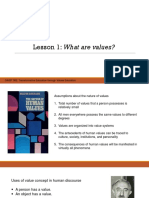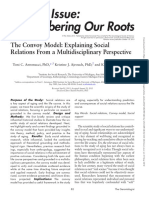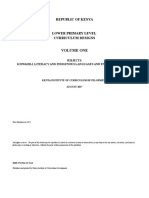Basic human values
Human values form the ethical foundation of society. They are shaped by individual
development, culture, and philosophical world views.
These values determine what is considered right or wrong, good or bad, and important or trivial
in human interactions.
Theories like those by Kohlberg, Schwartz, and Maslow help in understanding how values
evolve and operate.
However, the real challenge lies in applying these values consistently and resolving conflicts
through critical thinking, empathy, and open dialogue.
If we look at our living, it becomes clear that human living (our own living) can be seen
as encompassing the following 4 levels:
1. Myself
2. Family
� 3. Society
4. Nature/existence
On self-investigation, we find out that we want to be in harmony at all levels of our
living:
Harmony in myself (resulting in happiness and a feeling of prosperity)
Harmony in family (resulting in mutual fulfilment in relationship and prosperity in
the family).
Harmony in society (resulting in a trustful, undivided, universal society).
Harmony in nature/existence (resulting in being in harmony with nature, understanding
the inherent co-existence
Core Characteristics:
Universal in nature (e.g., honesty, compassion)
Culturally adaptive – expressed differently across societies
Subjective yet shared – personal interpretations but commonly agreed upon in a society
Principles Underlying Human Values
Human values are driven by certain core principle
Principle Description
Respect for Life Values uphold the dignity and sanctity of life in all forms
Freedom Values support the autonomy and freedom of individuals
Justice and Fairness Emphasize equality and impartiality in decision-making
Responsibility Emphasizes accountability and moral obligations toward others and society
Compassion Promotes empathy, kindness, and concern for others' well-being
Major Theories Explaining Human Values
a) Kohlberg’s Theory of Moral Development
Proposes three levels of moral reasoning
Pre-conventional – guided by self-interest and punishment/reward
Conventional – based on social norms and laws
Post-conventional – based on abstract principles and justice
Critique: Emphasizes justice and rational thinking, but less focus on emotions, cultural
differences, or care-based values.
b) Schwartz’s Theory of Basic Human Values
Identifies ten universal values across cultures such as:
�Security, Conformity, Tradition
Self-Direction, Stimulation, Hedonism
Achievement, Power, Benevolence, Universalism
Critique: Well-suited for global comparison but lacks depth in personal value formation and
conflict between values.
c) Maslow’s Hierarchy of Needs
Values emerge as needs are fulfilled: from physiological to self-actualization
Higher values like morality, creativity, and self-respect arise only after basic needs are met
Critique: Hierarchical nature is too rigid; people can seek higher values even in deprivation.
d) Rokeach Value System
Divides values into:
1) Terminal values (life goals like happiness, freedom)
2) Instrumental values (modes of conduct like honesty, responsibility)
Critique: Offers a structured list but may oversimplify cultural and situational influences.
Critical Issues in the Application of Human Values
Cultural Relativism vs. Universalism
Challenge: Whether values like human rights are universal or culturally dependent
Analysis: Some values (e.g., dignity, peace) appear universal, but their interpretation and
practice vary by culture.
Value Conflict
Example: Conflict between personal freedom and community norms (e.g., dress code, speech)
Resolution: Requires balancing rights with responsibilities through ethical reasoning
Instrumentalization of Values
Sometimes values are used manipulatively in politics, religion, or marketing without genuine
adherence.
Importance of Human Values in Professional and Social Life
In Professional Ethics: Ensure integrity, transparency, and accountability in fields like medicine,
engineering, and education.
In civic life: Foster social cohesion, democratic participation, and peaceful coexistence.
�In personal development: guide decision-making, build character, and promote self-respect.
Basic human values, as defined by theories like Schwartz's theory, are the core principles that
guide individual and collective behavior, while ethical theories provide frameworks for making
moral decisions.
Schwartz's theory identifies ten basic human values Schwartz- [Schwartz, 1992, 2005a]
These values are organized in a circular structure, with some values being compatible and others
conflicting.
Benevolence
Concern for the well-being of close others.
Universalism
Understanding, appreciation, tolerance, and protection for all people and for nature.
Self-direction:
Independent thought and action; choosing, creating, exploring.
Stimulation
Excitement, novelty, and challenge in life.
Hedonism
Pleasure and sensuous gratification for oneself.
Achievement
Personal success through demonstrating competence according to social standards.
Power
Social status and prestige, control or dominance over people and resources.
Security
Safety, harmony, and stability of society, of relationships, and of self.
Conformity
Restraint of actions, inclinations, and impulses likely to upset or harm others and violate
social expectations.
Tradition
Respect, commitment, and acceptance of the customs and ideas that traditional culture or
religion impose on the individual.
The values that affect prosocial behavior most frequently across contexts are-
� Universalism
Benevolence
Conformity
Security
Power
For example, Conformity and tradition values are negatively related to personal freedom
for gay people.
Further, hedonism and universalism values are positively related to freedom for gays.
This is also a plausible result. Those with hedonistic preferences are concerned about
personal pleasures, and universalism values express tolerance and protection of the
welfare of all people.
People’s life circumstances provide opportunities to pursue or express some values more
easily than others:
For example, wealthy persons can pursue power values more easily, and people who
work in the free professions can express self-direction values more easily.
� Life circumstances also impose constraints against pursuing or expressing values. Having
dependent children constrains parents to limit their pursuit of stimulation values by
avoiding risky activities.
And people with strongly ethnocentric peers find it hard to express universalism values.
In other words, life circumstances make the pursuit or expression of different values more
or less rewarding or costly.
For example, a woman who lives in a society where common gender stereotypes prevail
is likely to be rewarded for pursuing benevolence values and sanctioned for pursuing
power.
How Background Variables Influence Value Priorities
Typically, people adapt their values to their life circumstances. They upgrade the importance
they attribute to values they can readily attain and downgrade the importance of values whose
pursuit is blocked [Schwartz & Bardi, 97]
For example, people in jobs that afford freedom of choice increase the importance of self-
direction values at the expense of conformity values [Kohn & Schooler, 1983]
People’s age, education, gender, and other characteristics largely determine the life
circumstances to which they are exposed.
These include their socialization and learning experiences, the social roles they play, the
expectations and sanctions they encounter, and the abilities they develop. Thus, differences in
background characteristics represent differences in the life circumstances that affect value
priorities.
The Pattern of Value Relations with Other Variables in an Integrated System
The structure of values has two implications for value relations:
1. Values that are adjacent in the structure (e.g., power and achievement) should have similar
associations with other variables.
2. Associations of values with other variables should decrease monotonically in both directions
around the circle from the most positively to the most negatively associated value.
For example, say voting for a party with a left orientation correlates most positively with
universalism values and most negatively with security values.
Then, going from universalism round the circle to the right (benevolence, tradition, conformity,
security), correlations are likely to become less positive and more negative.
This is also likely going from universalism round the circle to the left
How age influences values
It is common to speak of three systematic sources of value change in adulthood:
Historical events that impact on specific age cohorts (e.g., war, depression)
�Physical ageing (e.g., loss of strength or memory)
life stage (e.g., child rearing, widowhood).
Each of these sources affects value-relevant experiences. They determine the opportunities and
constraints people confront and their resources for coping.
Cohorts
Inglehart [1997] demonstrated that older persons in much of the world give higher priority to
materialist vs. post-materialist values than younger people
younger groups will give greater priority to hedonism, stimulation, self-direction, and, possibly,
to universalism values, but less priority to security, tradition, and conformity values.
Physical ageing
1. Strength, energy, cognitive speed, memory, and sharpness of the senses decline with
age. Although the onset and speed of decline vary greatly, the decline rarely reverses.
2. This suggests several hypotheses. With age, security values may be more important
because a safe, predictable environment is more critical as capacities to cope with
change wane.
3. Stimulation values may be less important because novelty and risk are more
threatening.
4. Conformity and tradition values may also be more important with age because
accepted ways of doing things are less demanding and threatening.
5. In contrast, hedonism values may be less important because dulling of the senses
reduces the capacity to enjoy sensual pleasure.
6. Achievement and, perhaps, power values may also be less important for older people
who are less able to perform demanding tasks successfully and to obtain social
approval.
Life stage
1. Opportunities, demands, and constraints associated with life stages may cause age
differences in values.
2. Gender influences the experience of life stages, but we focus here on the main
effects of age.
3. In early adulthood, establishing oneself in the worlds of work and family is the
primary concern.
4. Demands for achievement are great, both on the job and in starting a family.
Challenges are many, opportunities are abundant, and young adults are expected
to prove their mettle.
5. These life circumstances encourage pursuit of achievement and stimulation values
at the expense of security, conformity, and tradition values.
6. In middle adulthood, people are invested in established family, work, and social
relations that they are committed to preserve.
� 7. Most are approaching the level of achievement they will attain. Work and family
responsibilities constrain risk-taking and opportunities for change narrow. Such
life circumstances are conducive to more emphasis on security, conformity, and
tradition values and less on stimulation and achievement values.
8. The constraints and opportunities of the pre-retirement life stage reinforce these
trends.
9. With retirement and widowhood, opportunities to express achievement, power,
stimulation, and hedonism values decrease further.
10. In contrast, the importance of security and the investment in traditional ways of
doing things make security and tradition values more important.
How gender and education influence values
1. Psychoanalytic theorists contend that women are more related and more affiliated
with others than men, whereas men are more autonomous and more individuated
[e.g., Chodorov, 1990].
2. "Cultural feminist" theories posit women's "self-in-relation," in contrast to men's
greater autonomy [e.g., Scott, 1988].
3. They claim that women show more concern for an ethic of care and responsibility,
while men focus more on an ethic of rights based on justice and fairness [Gilligan,
1982].
4. Evolutionary psychologists postulate that women probably gained evolutionary
advantage by caring for the welfare of in-group members.
5. Men probably gained evolutionary advantage by attaining and exploiting status and
power.
6. Social role theorists attribute gender differences to the culturally distinctive roles of
men and women.
7. Parsons and Bales [1985] hold that the allocation of women to nurturing roles reduces
competition and preserves family harmony.
8. Women assume more "expressive," person-oriented roles; men engage in and learn
more "instrumental," task-oriented roles.
9. Similarly, Bakan proposes “agency” and “communion” to distinguish men’s and
women’s modes of social and emotional functioning [Bakan, 1966].
10. These theories share a view of women as more relational, expressive, and communal,
and of men as more autonomous, instrumental, and agentic
11. These dissimilarities in men’s and women’s motives and orientations are likely to
find expression as different value priorities.
12. Specifically, they lead to the hypotheses that men more than women attribute
importance to power values in particular and also to achievement, hedonism,
stimulation and self-direction values.
13. Women attribute more importance than men especially to benevolence values and
also to universalism, conformity, and security values.
�Education
1. Educational experiences presumably promote the intellectual openness, flexibility, and
breadth of perspective essential for self-direction values (Kohn & Schooler 1983).
2. These same experiences increase the openness to non-routine ideas and activity central to
stimulation values.
3. In contrast, these experiences challenge unquestioning acceptance of prevailing norms,
expectations, and traditions, thereby undermining conformity and tradition values.
4. The increasing competencies to cope with life that people acquire through education may
also reduce the importance of security values.
5. There are expected positive correlations of years of formal education with self-direction
and stimulation values and negative correlations with conformity, tradition, and security
values.
6. In addition, education correlates positively with achievement values. The constant
grading and comparing of performance in schools, emphasizing meeting external
standards, could account for this.
7. The associations of education with values are largely linear, with the exception of
universalism values.
8. Universalism values begin to rise only in the last years of secondary school. They are
substantially higher among those who attend university.
9. This may reflect both the broadening of horizons that university education provides and a
tendency for those who give high priority to universalism values to seek higher
education.
10. Our value priorities influence whether we develop particular abilities, choose particular
friends, mates, jobs, and travel opportunities, and even whether we move to settings with
different political, economic, or religious systems.
11. These value-based choices, in turn, create life circumstances to which we then adapt our
values.





















































































